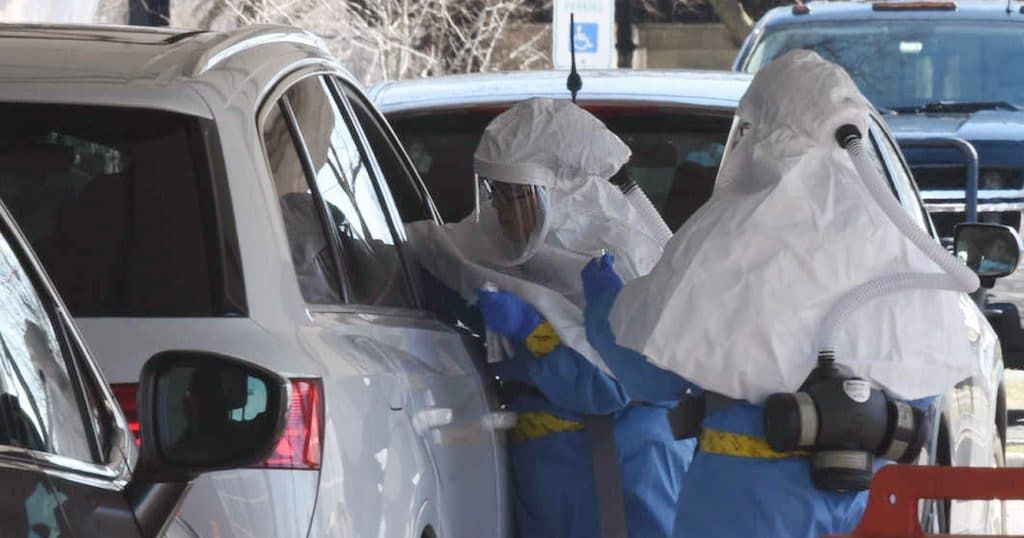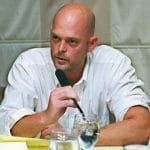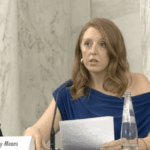The coronavirus diaries: “I would be lying if I said I don’t get flashes of fear”
By Nate Thayer | April 6, 2020
 Image courtesy of Senior Airman Sean Madden | United States National Guard
Image courtesy of Senior Airman Sean Madden | United States National Guard
As some of you know, under state law I am in quarantine, after having developed distinct symptoms of the coronavirus.
I want to be clear: While I am awaiting the results of yesterday’s tests for the virus, I will not know the results for another week or so.
In normal times, I would not really be concerned. But these are not normal times.
I have some difficulty breathing, and pain in my upper chest each time I inhale. I have a low-grade fever. I have a constant dry cough. These are all symptoms of the virus.
I contacted my doctor. The office is closed down for actual visits, so the appointment was by Zoom video conference. He alerted the state authorities. Yesterday, I was tested. Meanwhile, I have been ordered by the government and my doctor to behave as if I have the virus.
Here are some random thoughts on what it is like, for myself only, to live in this world turned upside down in recent weeks. I suspect it is similar for many others.
I have been practicing pretty strict “social distancing” for weeks now, as has most everybody I know. I live in a rural area. I don’t have neighbors in the sense that anybody in a city would define it.
Last week, my county had zero confirmed cases of the coronavirus. Early morning yesterday, there were 242. By late morning, there were almost 300.
I don’t see anybody, except for my couple-of-times-a-day stroll on the empty beaches with my best friend, my dog Lamont. I read a lot. I spend too much time watching television news. My computer hasn’t been turned off in a month.
All indications and science shows this is only going to get worse before it gets better.
Yesterday, I was ordered to report to what appeared to be Planet Pluto to be tested—an abandoned and shuttered community college where the state had taken over remote parking lots and set up armed checkpoints with scary signs and people dressed in Haz Mat Zoot Suits and rubber chemical warfare masks. I had to show an ID at checkpoint #1, through a closed car window I was instructed not to roll down, where they confirmed I was scheduled to be tested.
Checkpoint Zoot Suit man was concerned I had my dog in the car and radioed ahead to the other side of the parking lot to inform them I had a dog in the car. After some back-and-forth, I was approved to proceed. I was guided into an empty moonscape where there were no other cars—but there were temporary tents set up and more people dressed in the full regalia of Haz Mat suits, rubber masks, and gloves. They approached my car and pushed a series of signs with written instructions up to my closed window. We communicated by nodding “yes” or “no.”
I was then instructed to roll down the window one-quarter of the way. Lamont was alarmed and whining, detecting that something scary was going on. The wonderful woman in the Zoot Suit—doing the lord’s work (she likely has a family and more reason to be scared than me) was probably a nurse. She said through her gas mask to Lamont: “Don’t worry, sweetie. it will be alright. We aren’t going to hurt Nathaniel.”
I have been called “Nathaniel” a lot lately—always by doctors and nurses and medical professionals and hospitals. It’s a name I was last referred to by mother 50-plus years ago when she was angry and I had misbehaved. When she said it, I always knew I was in big trouble.
“Nathaniel Talbott Thayer?” the nurse in the chemical warfare gear asked, before sticking a swab deep into both nostrils. She then instructed me to roll the window back up and showed me a typewritten sign through the closed window protecting her from me—a guy who might be a vehicle to infect her mother, husband, parents, or children.
I felt guilty.
And this wasn’t the first time that I’d felt as if I’d done something wrong. A few minutes before I arrived at Planet Pluto testing center, I got lost and pulled over at a road construction site where a cop was directing traffic, to ask for directions to the college parking lot coronavirus testing center. The cop asked “Are you going to get tested?” and I’d said “yes.” The cop literally leapt backward with his eyes darting and a look of fear in his eyes.
I have never had a cop leap away from me, though I have had plenty of cops leap toward me over the years. The cop was scared of me.
I have been ordered to “self-quarantine” and not leave my house, under penalty of being arrested.
I don’t plan to be arrested.
I revisited in my mind who I have been in any modicum of close contact with in recent weeks, because we don’t know when or how people transmit this virus—even when one is asymptomatic. It could have been weeks ago.
Part of the problem is that we have had no consistent leadership or direction from our leaders. There were all kinds of false and mixed messages coming from the top, at the exact moment when our leaders should have been honestly giving people sober guidance.
I called several people who I have even indirectly been in physical proximity to over recent weeks, to inform them that there is a possibility I have the virus. I felt guilty with each conversation.
The roads are empty. The stores are closed. I am pretty well-stocked with food. But there are other things I need.
My 88 year-old mother—who I have always been convinced is going to outlive her four offspring, and maybe even live longer than God—is alone.
The helpers who would normally come spend the night to assist her in getting to the bathroom, ensuring there is food, changing her sheets, etcetera, have all left. She won’t let anyone—including her children—step inside her apartment. She is scared.
So is everyone I know.
No one I know wants to die. But more important to most people I know, is that they want to know what to expect next. To be able to prepare for the worst. They want to know that our leaders know what they are doing. To take charge. And we will listen. The absence of competent leadership is what is most frightening.
Today, where I live, there are 60 mile-per-hour winds and torrential rains. The weather is so extreme, they shut down the coronavirus testing center at the local community college for the day. They are warning of power outages, downed trees, flooding.
Sometimes, it feels like the apocalypse has arrived.
I expect to be fine, and I expect that I and most of us will emerge from this dark tunnel intact.
But I would be lying if I said I don’t get flashes of fear.
It is only normal, unlike the times we are living in.
Oftentimes, these last couple of years, it seems that there is so much to divide us: religion, race, politics. This is being fueled, in my opinion, by the leader of my country, who one month ago this week declared the virus was a “hoax” perpetrated by the “enemy of the people:” the media and his political opposition.
What I would ask—which I think is reasonable—is that those in charge be honest, competent, and have the integrity to let us all know what is going on.
Because I sure as hell don’t know what is going on at the moment…
(Editor’s note: American journalist Nate Thayer is a former war correspondent who was based in Cambodia. Thayer is probably best-known for getting the last interview with Pol Pot, just before the man responsible for “the Killing Fields” died in his jungle compound. Now a freelancer, his work has focused on international organized crime, narcotics trafficking, human rights, and areas of military conflict. This piece originally appeared as a post on Thayer’s Facebook account. It is published with permission of the author.)
Together, we make the world safer.
The Bulletin elevates expert voices above the noise. But as an independent nonprofit organization, our operations depend on the support of readers like you. Help us continue to deliver quality journalism that holds leaders accountable. Your support of our work at any level is important. In return, we promise our coverage will be understandable, influential, vigilant, solution-oriented, and fair-minded. Together we can make a difference.
Keywords: COVID-19, Coronavirus, emerging diseases, social distancing, virus
Topics: Biosecurity, Opinion
















David Attenorough posits WE are a plague on the Earth.
We are the pinnacle of awareness and intelligence on this planet. We need to act like it. Massive shifts are required now in the way we farm, produce energy, our hyper-consumerism capitalist societies, nationalism etc… If we don’t change now we will die as a species. Time is up… We need to choose.
This is horrible. I pray for Mr. Thayer and hope that he, his community and people world over come out stronger from this pandemic. Please look after yourself and my only request is that you stay strong.
I wish the best for you and your family Nate. Thank you for giving us such a personal glimpse into your own experience. Stories like this help us to support each other and feel less alone through these precarious times.